During Ramadan, how do our Muslim colleagues care for themselves even as they care for patients? Our nurses share their experiences.
During Ramadan, our Muslim colleagues carry on with their work as usual, with no changes to their daily routine - SSN Nazreen performs financial counselling as part of her duties in the clinic.
Contrary to popular belief, Hari Raya Puasa is not the Muslim New Year. It is a celebration to mark the end of Ramadan, the ninth month of the Muslim calendar in Islam, commonly known as the holy month of fasting. Ramadan is a time for Muslims to renew their focus on their spirituality and its application to daily life through abstinence from food or liquids from dawn to sunset (i.e. fasting for about 14 hours a day). The meal taken early in the morning is known as the pre-dawn meal, while the meal taken in the evening after fasting is the break-fast meal.
Does the mere thought of not eating/drinking for almost an entire day make you light-headed? Imagine what it feels like for our Muslim colleagues involved in patient care. How do they care for themselves while caring for others? Our nursing colleagues, Senior Staff Nurse (SSN) Nazreen Binte Abu Bakar from Cardiac Clinics and Senior Enrolled Nurse (SEN) Khabibah Binte Suhood from Ward 56, share more.
When did you start your Ramadan journey?
SSN Nazreen: I began my Ramadan journey at the age of six years. At that time, my mother would encourage me to begin fasting for half a day and gradually, fast the whole day. Hence, at the age of seven, I have learnt to fast the entire day.
SEN Khabibah: I started my Ramadan journey when I was seven years old as well - that was when I understood the reasons why Muslims fast.
How do you prepare for your nursing duties during Ramadan?
SSN Nazreen: During Ramadan, I would prepare my pre-dawn meals for the coming work week during the weekend so that I can rest longer to prepare for the day ahead. For break-fast meals in the evenings, I am fortunate that my mother would cook for my family so that I do not have to rush home to cook when I end work at 6pm. I am truly thankful to my mother’s care and help!
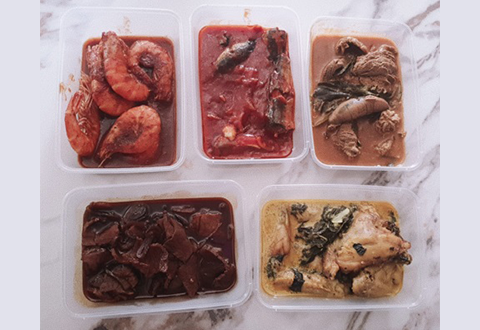
To prepare for the work week’s pre-dawn meals, SSN Nazreen cooked nutritious, protein-rich food in advance, saving time in the mornings and allowing her to rest longer.
SEN Khabibah: I carry out my nursing duties as per normal, regardless of the fasting month. As I am on permanent night shift which starts at 7pm while the time to break-fast is usually around 7.06pm to 7.10pm, I will drink a glass of water to symbolise break-fast, and resume my duties. When my work is more settled, usually around 9pm or so, I would have a proper meal.
How do you sustain your energy levels while caring for patients during Ramadan?
SSN Nazreen: For me, it is important to have a balanced diet for my pre-dawn meals, such as high-protein food and drinking lots of water, and to take my supplements. Mentally, I am prepared to fast so there is no issue sustaining my energy levels during the day.
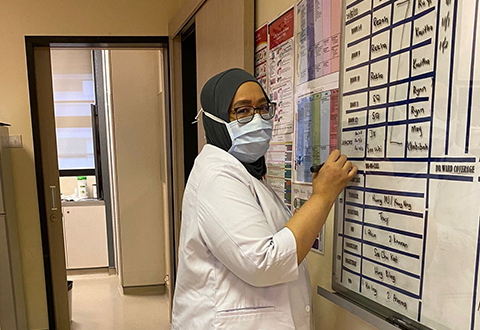
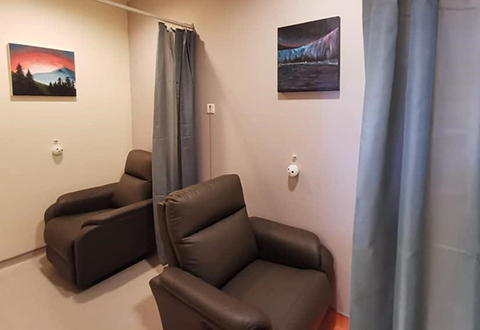
(L-R) During Ramadan, our Muslim colleagues carry on with their work as usual, with no changes to their daily routine – SEN Khabibah updating the list of doctors who are on-call; The staff respite room in Ward 56 offers a comfortable and quiet place for nurses to recharge.
SEN Khabibah: Fortunately, as a staff on permanent night shift, my challenges of fasting are lesser compared to my colleagues who work in the day. During my working hours at night, I am able to consume food during my breaks, up until my last meal before the fast begins at about dawn.
Do you communicate with your fellow colleagues at work about Ramadan so that they understand what you are doing? How do you communicate?
SSN Nazreen: Yes, we do talk about the values and reasons as to why we need to fast. My colleagues understand and would respect us by trying not to eat in front of us. It was certainly not easy to stay away from the delicious food when colleagues were eating around me but staying true to my faith helped!
SEN Khabibah: If my non-Muslim colleagues are eating or drinking while I am still fasting, they will usually apologise when they see me, but I do not take it to heart at all. They are also very caring and will remind me to take my meal even though we are in the midst of work handover. I am committed to what is needed of me as a Muslim and feel blessed to have such thoughtful colleagues who are understanding about my religion.
Is this year's Ramadan different for you as compared to last few pandemic years?
SSN Nazreen: It is definitely different as Covid-19 restrictions have lifted. We are looking forward to celebrate Hari Raya with the extended family such as meeting up with the uncles and aunties as well as our cousins.
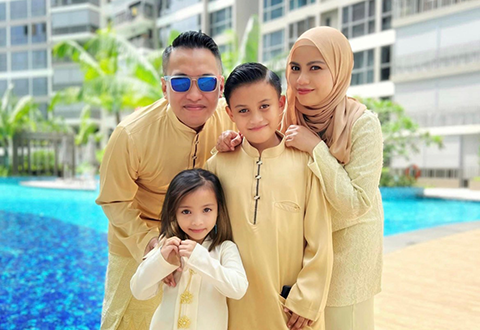
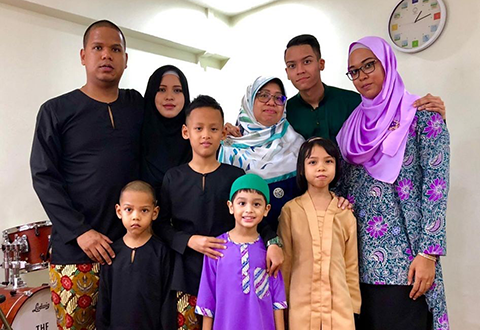
(L-R) It was all smiles at Hari Raya for SSN Nazreen (in gold outfit), and SEN Khabibah (middle) and their families. (Pictures taken in 2022)
SEN Khabibah: Last year, we rejoiced as the group size limitation lifted just one week before Hari Raya. This year, I expect it to feel extra special as my family will be celebrating in our new home.
Wishing all our Muslim colleagues, Selamat Hari Raya ahead!
